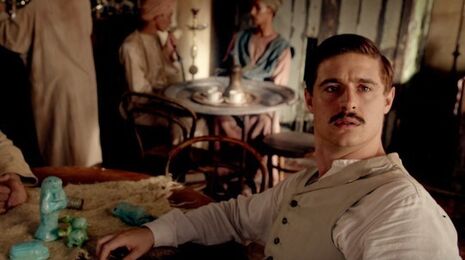TV: Tutankhamun
ITV’s latest period drama is nostalgic and adventurous but also troubling and thought-provoking. For Ellie Sanderson, Tutankhamun makes for enjoyable and interesting Sunday-night TV, despite its historical inaccuracies

I have a bit of an obsession with buried treasure. Maybe it’s just my inner 10-year-old. Or maybe I’m destined for a life of piracy. Either way, I found the adventures of maverick archaeologist Howard Carter fascinating. It’s a heady mix of sand, sweat, parasols and evening gowns – think Downton Abbey meets Indiana Jones – all framed by the breakdown of the British presence in Egypt.
1905, Valley of the Kings. The golden age of archaeology is over: the valley is all dug up, its secrets uncovered, its tombs raided.
Or so we thought! Cue Howard Carter, the impressively moustached archaeological genius who has a wild hunch: what if the valley isn’t empty after all? What if, for example, it still conceals the tomb of the forgotten boy-king, Tutankhamun? It’s a hunch that pays off – although it’s actually Lord Carnarvon (played by Jurassic Park’s Sam Neill) who does the paying, bankrupting his estate while funding the dig. Meanwhile Carter starts an affair with Carnarvon’s daughter, Evelyn...
Carter comes into conflict with pretty much everyone he meets – but that doesn’t stop him finding the tomb in a dramatic sequence and delivering his catchphrase as he looks on the “wonderful things” which fill the burial chamber. It was amusingly tense: I felt as stressed as if I was uncovering the lost tomb of Tutankhamun myself (rather than watching ITV Player and ignoring all my deadlines)
Apart from sporting some very fine fezzes, the Egyptian Antiquities Department also introduces the interesting wider questions of the series: to whom does this treasure belong? Are Carter and Carnarvon pioneers – or plunderers? And what makes them any better than grave robbers? Because, at the heart of all the swashbuckling adventure, the glamour of imperial Egypt and the sweeping shots of starlit deserts is the troubling question of whether the British should be interfering there at all. The antithesis between the antiquities department and Team “Carnarter” becomes a symbol for the larger-scale rebellion brewing against the British forces who have long outstayed their welcome in Egypt, and which eventually overflows into rioting. Carter and Evelyn, angry and defiant, argue that they should get to keep some of Tutankhamun’s artefacts as a kind of finders’ fee. But I’m inclined to agree with the antiquities department – Egypt’s historical and cultural heritage isn’t a free-for-all to be pillaged by wealthy Westerners. True, without those Westerners the tomb would have perhaps have remained undiscovered for another century, but that may not have been such a bad thing. The unearthing of Tutankhamun’s burial chamber would definitely have provided a much needed pick-me-up for 2016, don’t you think?
“What are you looking for?”, Carter is asked in the first episode. Back then he thinks he is searching for a lost tomb, the tomb of a king – buried treasure, even. But perhaps all this digging in the sand is simply him trying to recover something that is, well, irrecoverable – the past. This is what he is searching for, but what he finds, as he assures us in the final episode – is love. And yet he is doomed never to possess it – possibly because this would shift the story from historically inaccurate to an outright fabrication.
And yet this is a fitting conclusion. I think that, for Carter, treasure is precious because it does not – and cannot – belong to him. The final scene depicts Carter lingering in the now empty tomb of Tutankhamun, alone with the echoes of the buried gold, and the memory of Evelyn. It’s beautifully nostalgic: for the hopes and spark of his idea, for the thrill of the search, and for a time which has already gone. It may not be historically accurate, but then again, if you want historical accuracy, you should read the encyclopaedia instead of watching period dramas on Sunday evenings...
 Interviews / ‘People just walk away’: the sense of exclusion felt by foundation year students19 April 2024
Interviews / ‘People just walk away’: the sense of exclusion felt by foundation year students19 April 2024 News / John’s spent over 17 times more on chapel choir than axed St John’s Voices22 April 2024
News / John’s spent over 17 times more on chapel choir than axed St John’s Voices22 April 2024 Theatre / The closest Cambridge comes to a Drama degree 19 April 2024
Theatre / The closest Cambridge comes to a Drama degree 19 April 2024 News / Copycat don caught again19 April 2024
News / Copycat don caught again19 April 2024 News / Corpus student left with dirty water for over six months21 April 2024
News / Corpus student left with dirty water for over six months21 April 2024





